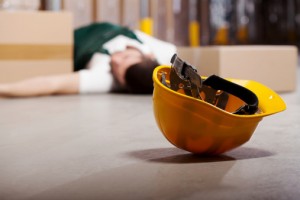 Falls are the leading cause of construction accident fatalities, prompting federal regulators to put a special focus on fall prevention for construction workers. But falls can happen no matter where you work – even in a seemingly safe office setting.
Falls are the leading cause of construction accident fatalities, prompting federal regulators to put a special focus on fall prevention for construction workers. But falls can happen no matter where you work – even in a seemingly safe office setting.
Whether you work in retail, real estate, manufacturing or somewhere else, you may face the risk of a fall.
All employers have a responsibility to keep workers safe from harm on the job, and that includes correcting hazards that may lead to injuries in a fall.
Regardless of your job title or work setting, a fall can occur if you:
- Use a ladder or step stool.
- Have to work outdoors or walk from one building to another.
- Climb stairs or ride an elevator.
- Walk across various flooring materials (for example, from carpet to laminate or tile).
- Have to cross wet floors.
- Work where floors are regularly waxed or polished.
- Step over electrical cords.
- Walk through gravel.
- Work among clutter or obstacles.
And the list goes on.
As you can see, fall risks are everywhere.
Employer Duties to Prevent Falls
Your employer is legally obliged to minimize job hazards. Here in the Northeast, that includes salting walkways and scooping snow in the wintertime. But it also includes correcting slip-and-fall hazards indoors by ensuring that:
- Stairways and walkways are well lit and without raised tiles or uneven flooring.
- Spills are quickly cleaned up and wet floor signs displayed.
- Walkways are checked for worn carpet, obstacles and garbage.
- Ladders and step stools are regularly inspected.
As an employee, you should notify your manager about potential hazards and risks. An employer who is aware of a hazard should make a reasonable effort to fix the situation.
In June, the Occupational Safety and Health Administration sponsored a nationwide “Safety Stand-Down” for fall prevention in construction. The event called on the construction industry to take time for training and safety efforts to reduce fall fatalities. Considering that falls kill more than 200 construction workers annually, the promotion was warranted.
But workplace accidents happen under a variety of circumstances in all sorts of settings. And no matter what job you hold, your employer is responsible for keeping your work environment safe.
